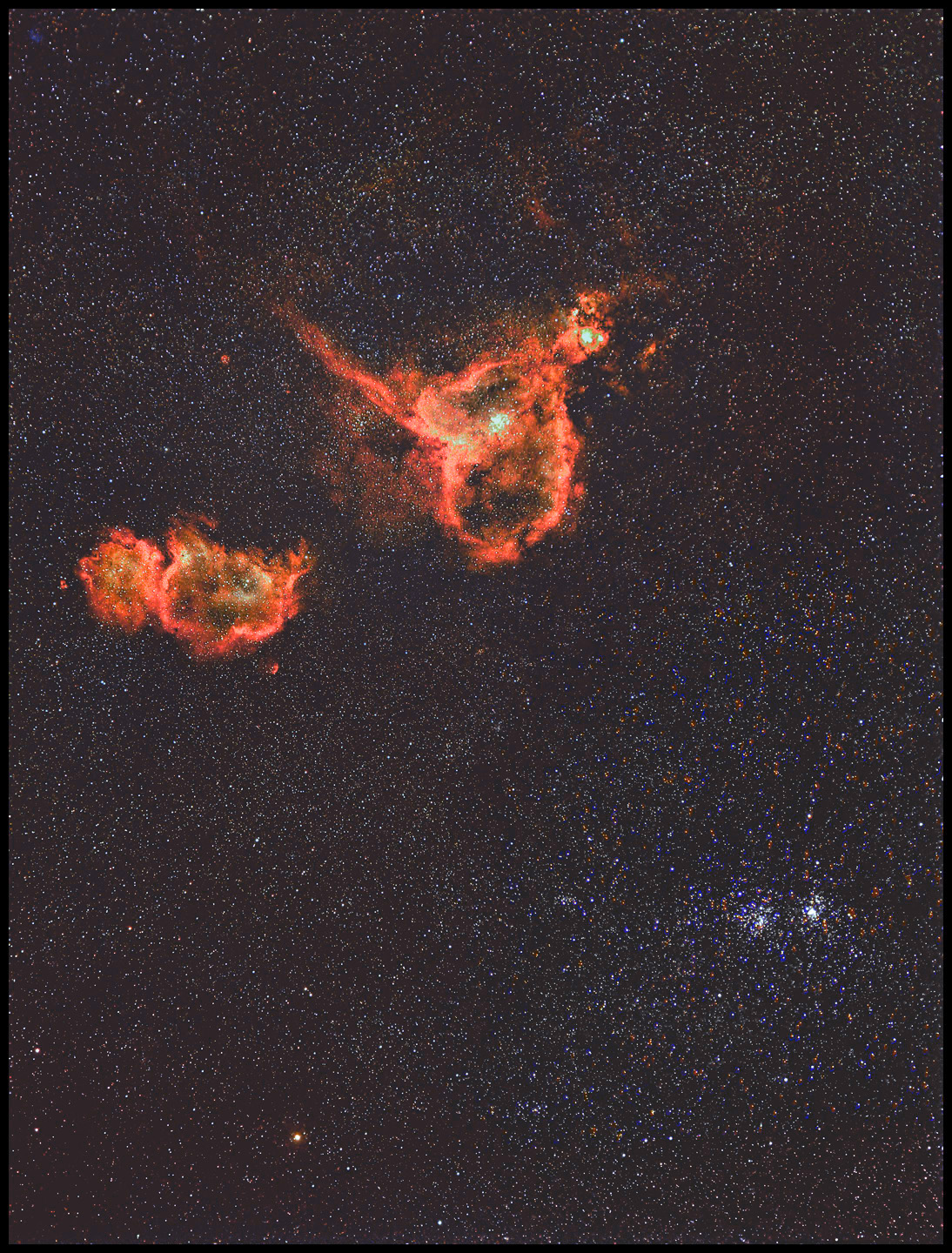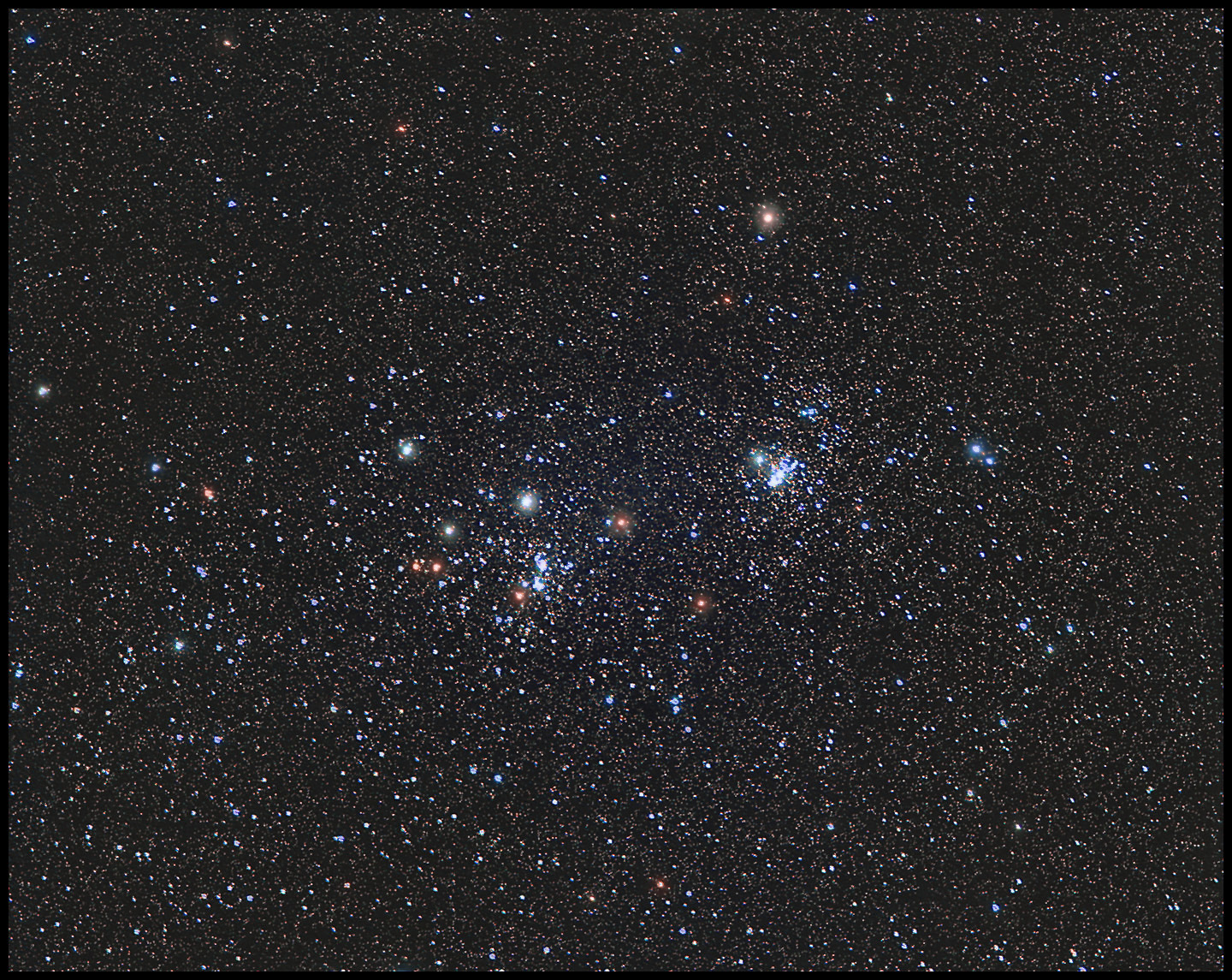The Starry Night, 267 :: home :: |
Hybrid OSC
So we have two and a half hours of narrowband data acquired in 60s gulps at gain 300 (highlights got a little overexposed; I was trying to keep processing time in reason). I rendered that data starless then stretched the nebulae and mixed the stars back in. I expected the star colors to be decidedly off while using only a mix of Ha and Oiii. That mattered because the Double Cluster was a major part of the composition, and I thought it ought to look right. So I finished with 20, 30-second exposures, gain 139, through a UV/IR filter to capture better star colors and then overlayed that data on the dualband image. Given its purpose, the color data was only casually focused. I think that worked. It could be done better, but it works. In other news, I've destroyed my 20AH Li-ion battery. I accidentally shorted it for 10-15 seconds (the smell alerted me). Now it will not take more than an 8v charge. How to safely store and dispose of a damaged lithium battery is a new-to-me problem. Replacing it is an altogether familiar one (Amazon has a 50A version on the way, with internal short protection and an actual lithium-oriented battery charger). In the meantime, I'm confined to the backyard where I can use a Pyramid power supply.
2024/12/23. Of course -- it's still 2024 -- the Pyramid power supply is suddenly providing 24v rather than its usual 13.5v. While I tried to set up the A-P and 400mm for some deeper stuff tonight, I saw that reading on the power-box's voltmeter. I unplugged everything and looked for trouble. A "real" voltmeter confirmed the over-volt. I have a smaller Pyramid power supply that will keep the show on the road, provided I haven't cooked anything. Online consensus is that the A-P controller and the ZWO camera should handle this degree of brief misadventure without issue. This evening, I forgot to polar align the mount(!). I set it up close, then in my haste to calibrate the go-to routines on Deneb, I forgot that I hadn't actually lined it up. My first go-to was so far off that I knew I'd screwed something up. So I lined up Polaris in the polar 'scope. Then tried to center Deneb again for another recal. The power cord to the 1600MC ran out of slack and stalled the motor (which is much better than ripping the camera apart). I untangled stuff and tried again. I did at last center and re-calibrate on Deneb, then tried to slew to NGC 869. Came nowhere close. Then things got weird and stayed that way. I was treated to a nice fireball about 7:45. It was long, slow, -4 or a bit brighter, white or pale yellow, westbound just south of the zenith, fragmenting at the end; maybe a Delta Cancrid. The red-dot finder is not aligned well enough to use properly with the 400mm. I just put the dot in the vicinity of the invisible Double Cluster and looked around until I recognized the neighborhood. Slews seemed very strange: directly commanded slews worked, those commanded by the hand control to slew to a specified target wandered way off somewhere while the gears made caterwhauling noises. Look into that. Maybe the cold weather and the too-small power supply (it's driving the camera and the mount which is not especially well balanced under the 400mm F2.8 and the 1600MC) is fouling something up. Maybe the worm gears need remeshing. I could do with regreasing everything with the proper lube. It's in my shopping cart. Maybe next month. I just hope I haven't cooked any of the hand control's logic circuits. When I finally framed the Double Cluster, I saw that the orientation of the chip is odd. And in all the flurry of this and that tonight, I never checked the box to turn on the camera's cooler -- I verified the specified temperature, but never turned it on. Still. It's -2C out there, so not much harm done. I've cropped the image below without mercy. I didn't want to try rotating the camera so late in the game tonight, but add that to the preliminary steps: initialize the camera, focus, adjust orientation, confirm or refine focus, take flats, calibrate the mount.
2024/12/24. Preparations: I aligned the red dot finder, tested the cooler to make sure I'd merely neglected to turn it on, remeshed the A-P mount's RA gear, shimmed the Canon-Nikon adapter, and moved the mount a few feet for better access to the sky. I'll put off testing commanded slews until later, but I can at least "drive to" targets and locate them with the finder tonight (try reduced speed with the smaller power supply). Things that would be nice: An actual Nikon F to ZWO adapter (less play) with or without a filter drawer (think on it). The appropriate grease to dress the A-P's gears (lay in a stash before its next tear down and cleaning). A working, high-capacity battery to power the rig to escape being tethered to AC (on the way). Tonight, we'll try M33 if all goes well. Here's the plan: polar align, calibrate, Things worked out very nicely. Click the next page for a look.
:: top :: |
© 2024, David Cortner

